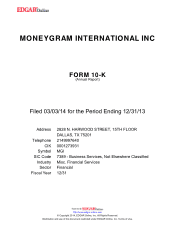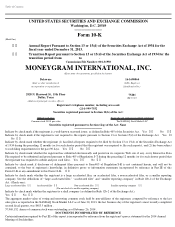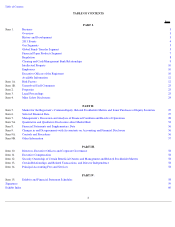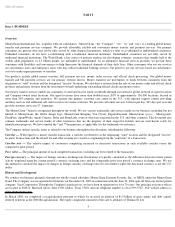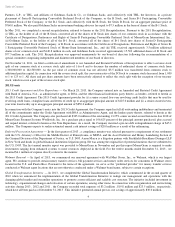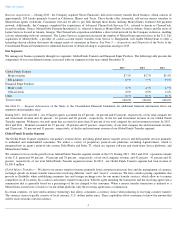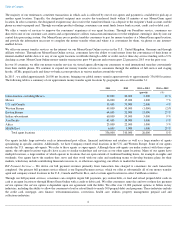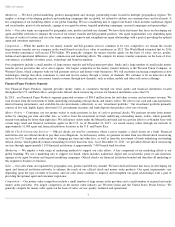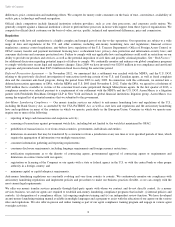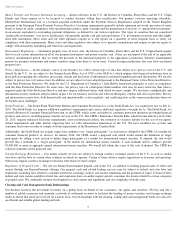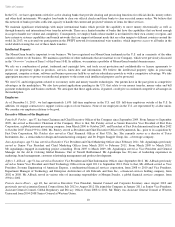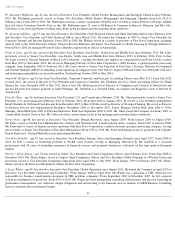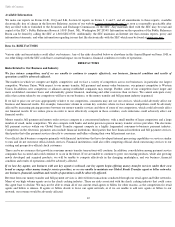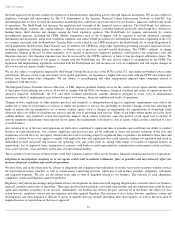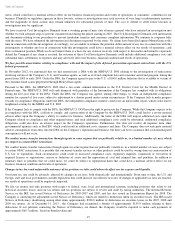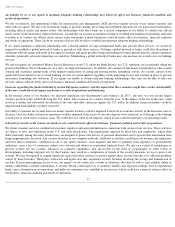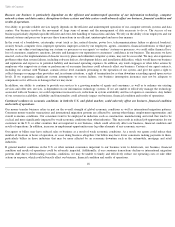MoneyGram 2013 Annual Report Download - page 10
Download and view the complete annual report
Please find page 10 of the 2013 MoneyGram annual report below. You can navigate through the pages in the report by either clicking on the pages listed below, or by using the keyword search tool below to find specific information within the annual report.
Table of Contents
differences, price, commission and marketing efforts. We compete for money order consumers on the basis of trust, convenience, availability of
outlets, price, technology and brand recognition.
Official check competitors include financial institution solution providers, such as core data processors, and corporate credit unions. We
generally compete against a financial institution’s desire to perform these processes in-
house with support from these types of organizations. We
compete for official check customers on the basis of value, service, quality, technical and operational differences, price and commission.
Regulation
Compliance with laws and regulations is a highly complex and integral part of our day-to-
day operations. Our operations are subject to a wide
range of laws and regulations of the U.S. and other countries, including anti-
money laundering laws and regulations; financial services
regulations; currency control regulations; anti-bribery laws; regulations of the U.S. Treasury Department’
s Office of Foreign Assets Control, or
OFAC; money transfer and payment instrument licensing laws; escheatment laws; privacy, data protection and information security laws; and
consumer disclosure and consumer protection laws. Failure to comply with any applicable laws and regulations could result in restrictions on our
ability to provide our products and services, as well as the potential imposition of civil fines and possibly criminal penalties. See “ Risk Factors ”
for additional discussion regarding potential impacts of failure to comply. We continually monitor and enhance our global compliance programs
to comply with the most recent legal and regulatory changes. Since 2009 we have invested over $120.0 million in our compliance and anti-
fraud
programs and prevented more than $365.0 million in fraud losses during the same time period.
Deferred Prosecution Agreement
—
In November 2012, we announced that a settlement was reached with the MDPA, and the U.S. DOJ,
relating to the previously disclosed investigation of transactions involving certain of our U.S. and Canadian agents, as well as fraud complaint
data and the consumer anti-
fraud program, during the period from 2003 to early 2009. In connection with this settlement, we entered into a
deferred prosecution agreement, or DPA, with the MDPA and U.S. DOJ dated November 8, 2012. Under the DPA, we agreed to a forfeiture of
$100 million that is available to victims of the consumer fraud scams perpetrated through MoneyGram agents. In the first quarter of 2013, a
compliance monitor was selected pursuant to a requirement of our settlement with the MDPA and the U.S. DOJ. Aaron Marcu is a litigation
partner with Freshfields Bruckhaus Deringer LLP in New York and heads its global financial institutions litigation group. Aaron Marcu was
among the original list of potential monitors that we submitted to the government.
Anti
-Money Laundering Compliance — Our money transfer services are subject to anti-
money laundering laws and regulations of the U.S.,
including the Bank Secrecy Act, as amended by the USA PATRIOT Act, as well as state laws and regulations and the anti-
money laundering
laws and regulations in many of the countries in which we operate, particularly in the European Union. Countries in which we operate may
require one or more of the following:
Anti-
money laundering regulations are constantly evolving and vary from country to country. We continuously monitor our compliance with
anti-
money laundering regulations and implement policies and procedures to make our business practices flexible, so we can comply with the
most current legal requirements.
We offer our money transfer services primarily through third-
party agents with whom we contract and do not directly control. As a money
services business, we and our agents are required to establish anti-
money laundering compliance programs that include: (i) internal policies and
controls; (ii) designation of a compliance officer; (iii) ongoing employee training and (iv) an independent review function. We have developed
an anti-
money laundering training manual available in multiple languages and a program to assist with the education of our agents on the various
rules and regulations. We also offer in-
person and online training as part of our agent compliance training program and engage in various agent
oversight activities.
8
•
reporting of large cash transactions and suspicious activity;
• screening of transactions against government watch-lists, including but not limited to, the watch-
list maintained by OFAC;
•
prohibition of transactions in, to or from certain countries, governments, individuals and entities;
•
limitations on amounts that may be transferred by a consumer or from a jurisdiction at any one time or over specified periods of time, which
require the aggregation of information over multiple transactions;
•
consumer information gathering and reporting requirements;
•
consumer disclosure requirements, including language requirements and foreign currency restrictions;
•
notification requirements as to the identity of contracting agents, governmental approval of contracting agents or requirements and
limitations on contract terms with our agents;
•
registration or licensing of the Company or our agents with a state or federal agency in the U.S. or with the central bank or other proper
authority in a foreign country; and
•
minimum capital or capital adequacy requirements.

